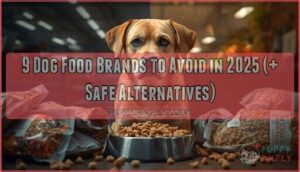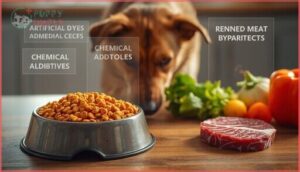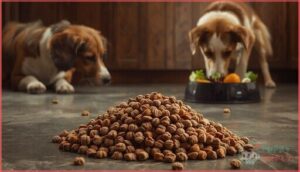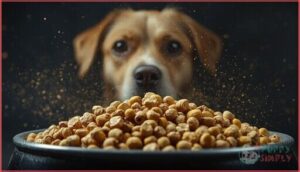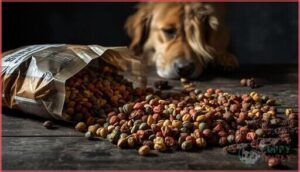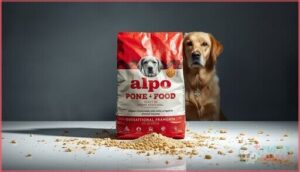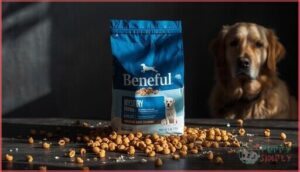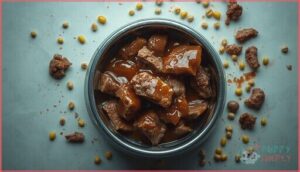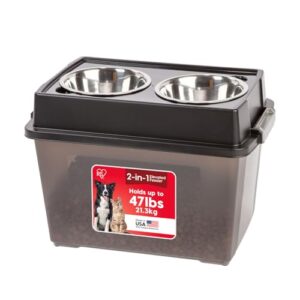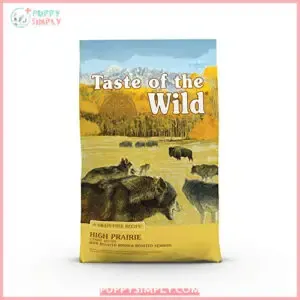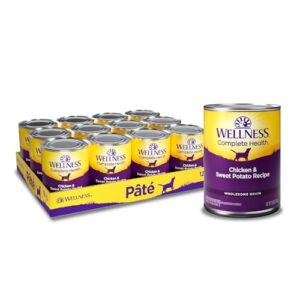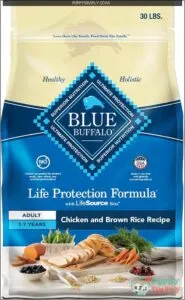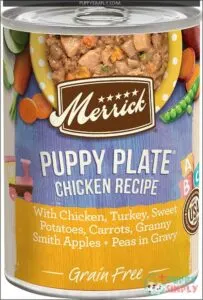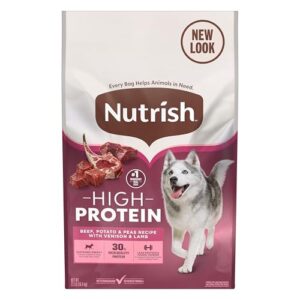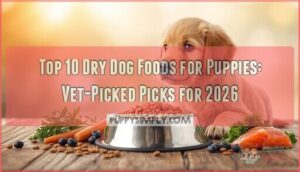This site is supported by our readers. We may earn a commission, at no cost to you, if you purchase through links.
Your dog’s food bowl might be hiding a slow-motion health crisis. Many commercial dog foods contain ingredients that don’t just fail to nourish—they actively harm. We’re talking about synthetic preservatives linked to tumor development, fillers that trigger allergic reactions in up to 14% of dogs, and mystery meat products with zero transparency about what’s inside.
The pet food industry isn’t as regulated as you might think, and some brands with household names have recall histories that would shock most dog owners. Understanding which dog food brands to avoid isn’t about being overprotective. It’s about recognizing that the cheapest option at the store often comes with hidden costs your dog will pay with their health.
The good news? Once you know what to look for, steering clear of problem brands becomes straightforward.
Table Of Contents
- Key Takeaways
- Key Signs of Low-Quality Dog Food
- Harmful Ingredients Commonly Found in Dog Food
- Worst Dog Food Brands to Avoid
- Health Risks Linked to Poor Dog Food
- Top Recommended Dog Food Alternatives
- Frequently Asked Questions (FAQs)
- What are the most common symptoms of canine dilated cardiomyopathy (DCM)?
- How can I determine if my dog’s food is causing DCM?
- What are the best protein sources for dog food?
- How can I avoid artificial additives in dog food?
- What are the best dog food brands for large breeds?
- How do I transition my dog to better food?
- Are grain-free diets actually healthier for dogs?
- What certifications indicate high-quality dog food?
- Can homemade dog food replace commercial brands?
- How much should I budget for quality dog food?
- Conclusion
Key Takeaways
- Many common dog food brands use fillers like corn and soy, artificial preservatives, and vague meat byproducts that can harm your dog’s health over time.
- Brands with frequent recalls, such as Kal Kan Complete Adult, Purina Dog Chow, IAMS, and Gravy Train, often show poor ingredient quality and safety concerns.
- Feeding your dog low-quality food increases risks for allergies, digestive problems, obesity, poor coat condition, and chronic diseases.
- Choosing foods with real meat, transparent labeling, and without artificial additives—like Wellness, Blue Buffalo, and Taste of the Wild—supports better nutrition and long-term health.
Key Signs of Low-Quality Dog Food
Not all dog food is created equal. Some brands cut corners with cheap ingredients that do more harm than good.
Here are four red flags that should make you think twice before buying.
Excessive Fillers Like Corn and Soy
When you spot corn or soybean meal near the top of an ingredient list, you’re looking at nutritional dilution in action. These fillers bulk up dog food cheaply but deliver minimal nutrition. About 55% of pet owners worry about these ingredients for good reason.
Poor dog food ingredients like corn can trigger allergen sensitivity in 3-14% of dogs. Watch for ingredient splitting tactics that hide how much filler is actually inside. Many brands use fillers to increase food volume.
Artificial Preservatives and Colors
Beyond fillers, artificial preservatives in dog food pose real health risks. BHA and BHT have been linked to tumor development in lab animals. The FDA allows up to 150 mg/kg—levels you won’t find in human food.
Watch for color carcinogens too. These petroleum-based dyes serve zero nutritional purpose but carry allergenic risks. Natural alternatives like vitamin E exist, though synthetic preservatives still dominate 64% of the market.
Some dog food may also contain harmful levels of ethoxyquin.
Lack of Ingredient Transparency
Preservatives aren’t the only red flag. When dog food brands use vague terms like “meat meal” or “animal digest,” that’s a labeling loophole hiding questionable sourcing. You can’t verify what you can’t identify.
Consumer awareness matters here—88% of pet owners say ingredient transparency affects their purchasing decisions. Without clear dog food ingredient labeling, you’re trusting blind faith over brand accountability. Regulatory oversight exists, but it’s not enough without sourcing verification.
History of Recalls and Safety Issues
Vague labels are one thing. A brand’s recall history tells you everything about quality control and dog food safety. Between 2020 and 2025, FDA oversight documented 45 pet food recalls—68.8 million pounds pulled from shelves.
A brand’s recall history reveals everything about quality control—45 pet food recalls pulled 68.8 million pounds from shelves between 2020 and 2025
Watch for recurring patterns:
- Melamine contamination triggered nearly 25% of all recalls over two decades
- Salmonella outbreaks represented 23% of total recalls, with Diamond Pet Food pulling 24.8 million pounds in 2012 alone
- Vitamin D toxicity led to Hill’s recalling 675,000 cases in 2019
Repeat offenders show systemic failures in manufacturing standards.
Harmful Ingredients Commonly Found in Dog Food
Not all dog food ingredients are created equal. Some additives can compromise your dog’s health over time, even if they make the food cheaper to produce.
Let’s look at three ingredient categories you should watch out for on any dog food label.
Synthetic Preservatives (BHA, BHT, Ethoxyquin)
You might spot BHA, BHT, or ethoxyquin on labels—artificial preservatives that raise real concerns. These harmful dog food ingredients carry long-term effects like liver damage and increased cancer risk in studies.
BHA and BHT cause bioaccumulation in tissues, while ethoxyquin links to reproductive issues.
Despite regulatory oversight allowing them, veterinary advisories recommend choosing safe alternatives without synthetic preservatives for better health outcomes.
Fillers: Corn, Wheat Gluten, Soybean Meal
In cheap formulas, you’ll find corn, wheat gluten, and soybean meal listed among the first four dog food ingredients—a clear sign of low-quality dog food. These fillers offer minimal nutritional value and poor digestibility compared to meat proteins.
Corn appeared in over 1.2 million tons of U.S. pet food in 2019, reflecting its economic impact. Wheat causes allergic reactions in roughly 15% of cases, while soy triggers hypersensitivity in sensitive breeds.
Artificial Colors and Flavors
Beyond additives and artificial preservatives, synthetic dyes like Red 40 and Blue 2 serve no nutritional purpose. These artificial colors pose carcinogenicity risks in animal studies, prompting retailer bans at stores like Petco in 2019.
Artificial flavors mask poor-quality proteins in cheap formulas.
Consumer concerns have driven brands toward natural alternatives, with 95% of pet owners prioritizing ingredient transparency and flavoring transparency when choosing dog food.
Worst Dog Food Brands to Avoid
Now let’s look at the specific brands that consistently fail to meet basic nutritional standards. These products share common problems like poor ingredient quality and questionable manufacturing practices.
Here are nine dog food brands you should keep off your shopping list.
Kal Kan Complete Adult
Kal Kan Complete Adult stands out among worst dog food brands for its reliance on low-quality ingredients. Through ingredient analysis, you’ll find corn and meat by-products dominate the formula, creating significant nutritional deficiencies.
Owner reviews consistently report health risks in dog food linked to this brand, from digestive upset to poor coat condition. Brand reputation has suffered due to its use of fillers over quality protein.
Cost comparison reveals cheaper alternatives often deliver better nutrition than this low-quality dog food option.
Purina Dog Chow
Purina Dog Chow consistently ranks among worst dog food brands due to substantial nutritional deficiencies and questionable ingredient analysis. Your dog deserves better than this low-quality dog food, despite its widespread availability.
Brand reputation suffers from legitimate health concerns:
- Artificial preservatives dominate the formula
- Minimal whole meat protein sources
- Consumer reviews document digestive problems
- Dog food brand evaluation reveals poor nutrient density
- Health risks in dog food include potential long-term complications
IAMS Dog Food
IAMS Dog Food earns its place among worst dog food brands through concerning ingredient quality and recall history. Veterinary assessment reveals unidentified meat byproducts, corn as primary filler content, and beet pulp contributing to nutritional deficiencies.
This dog food brand evaluation shows ingredients to avoid in dog food, including recalls due to mold growth that directly threatened pet safety.
Twin Pet Dog Food
Twin Pet Dog Food stands out among the worst dog food brands for its heavy reliance on corn as the primary ingredient. Corn content dominates the formula, while wheat middlings fill out the rest.
This low-quality dog food offers minimal nutritional value for your pet. Dog food ingredient analysis reveals poor ingredient sourcing practices and a brand reputation built on cheap fillers rather than quality nutrition.
Kibbles ‘n Bits
Another brand with a troubling brand reputation, Kibbles ‘n Bits, raises red flags in any dog food brand analysis. Ingredient analysis shows harmful dog food ingredients that make this an unhealthy dog food choice:
- Corn as the primary ingredient
- Soybean meal providing low-quality protein
- Meat by-product meals of questionable origin
- Artificial preservatives extending shelf life
Consumer reviews consistently flag nutritional deficiencies, while recall history documents safety concerns.
Alpo
Like Kibbles ‘n Bits, Alpo presents serious concerns for dog owners evaluating low-quality dog food. This brand’s Alpo ingredients include corn, corn gluten meal, and unidentified bone meal—all harmful dog food ingredients that offer minimal nutrition.
| Component | Issue | Health Impact |
|---|---|---|
| Corn/Corn Gluten | Primary ingredients | Poor digestibility |
| Bone Meal | Unknown source | Safety concerns |
| Preservatives | Chemical-based | Potential toxicity |
| Protein | By-products | Low bioavailability |
Alpo nutrition fails to meet quality standards, making Alpo alternatives essential for your dog’s health.
Beneful
Beneful raises significant ingredient concerns for dog health problems. This low-quality dog food brand features corn, soy, and unidentified byproducts, plus artificial preservatives that undermine consumer trust.
Here’s the health impact breakdown:
- Corn and soy fillers displace quality protein
- Artificial additives in dog food create long-term risks
- Recall history includes contamination issues
You’ll want to explore alternatives analysis for safer dog food brands.
Cesar
With Cesar, your dog faces exposure to meat byproducts, whole grain corn, and artificial colors that signal poor quality ingredients. The brand’s nutritional deficiencies stem from ingredient sourcing practices that prioritize cost over your pet’s health.
Cesar Filets and other varieties contain artificial additives that contribute to digestive problems and allergies. The brand reputation reflects ongoing concerns about low-quality dog food formulations causing dog health problems.
Gravy Train
Gravy Train exemplifies low-quality dog food through its corn, soybean meal, and meat byproducts foundation. The brand’s recall history includes dangerous vitamin D toxicity incidents that caused serious health concerns in dogs nationwide.
Your dog deserves better than these unhealthy dog food ingredients:
- Corn dominates the ingredient analysis instead of quality protein
- Unidentified meat byproducts lack nutritional transparency
- Brand reputation suffers from documented safety failures
Skip this harmful dog food brand entirely.
Health Risks Linked to Poor Dog Food
Feeding your dog low-quality food doesn’t just mean poor nutrition—it can lead to serious health problems that affect their quality of life. The wrong ingredients can trigger a cascade of issues, from immediate digestive upset to long-term chronic conditions.
Here are the most common health risks your dog may face from consistently eating poor-quality food.
Digestive Issues and Food Allergies
Poor dog food can trigger digestive issues and food allergies in your pet. Studies show that beef, dairy, and chicken cause the most reactions, affecting up to 40% of dogs with itching problems. These allergies often lead to vomiting, diarrhea, and colitis.
| Common Allergens | Diet Impact |
|---|---|
| Beef (34%) | Inflammation, poor nutrient absorption |
| Dairy (17%) | Vomiting, chronic diarrhea |
| Chicken (15%) | Digestive symptoms, skin reactions |
| Wheat (13%) | Food intolerance, gut microbiome disruption |
| Artificial preservatives | Allergic reactions in sensitive dogs |
Ultra-processed kibble disrupts your dog’s gut microbiome more than minimally processed diets. This increases chronic enteropathy risk and digestive symptoms. Raw or whole-food diets support better bacterial diversity and reduce gastrointestinal problems.
Obesity and Weight Gain
Low-quality dog food is a major driver of canine obesity—65% of US dogs are now overweight or obese in 2025. Ultra-processed kibbles with filler ingredients like corn and wheat contribute to 75% of weight gain cases.
These foods pack excess calories without nutrients, leading to fat accumulation. Obesity doubles diabetes risk and increases joint problems fivefold.
Switching to high-protein, low-carb diets promotes healthy weight management.
Skin and Coat Problems
Roughly 25% of all vet visits involve skin and coat concerns linked to dietary deficiencies in low-quality dog food brands. When your dog lacks essential fatty acids—especially omega-3 and omega-6—you’ll notice dull fur, flaky skin, and relentless itching.
Artificial preservatives like BHA trigger skin allergies and atopic dermatitis in sensitive dogs.
High-quality diets with probiotics benefit skin barrier function and reduce inflammation naturally.
Increased Risk of Chronic Diseases
Your dog’s long-term health hangs in the balance when you feed low-quality dog food laden with artificial additives. Synthetic preservatives increase cancer risks, while ultra-processed kibble triggers chronic enteropathy that persists into adulthood.
Between 2014 and 2022, over 524 DCM cases were linked to grain-free diets high in legumes. Poor diets also raise renal disease risk by 30% and hepatic disease by 60%.
Top Recommended Dog Food Alternatives
Now that you know what to avoid, let’s look at better options. The brands below meet higher nutritional standards and use quality ingredients your dog can actually digest.
Each one offers transparency in sourcing and has a solid track record for safety.
1. IRIS USA Elevated Dog Bowls
While choosing the right dog food brands matters, you’ll also want to think about how you feed your pet. The IRIS USA Elevated Dog Bowls combine bowl elevation benefits with food storage freshness in one unit. This design improves digestion and reduces neck strain for large dogs.
The stainless steel bowls resist odors and maintain material build quality. The airtight container holds 47 pounds of dry food while keeping it fresh. Cleaning and maintenance stay simple with removable dishwasher-safe bowls.
User satisfaction ratings consistently praise this feeder’s durability and convenience for daily feeding routines.
Best For: Large dogs, senior dogs with arthritis or mobility issues, and pet owners who want convenient food storage with elevated feeding benefits.
- Combines elevated bowls with 47-pound food storage in one space-saving unit, keeping dry food fresh and protected from pests with airtight seals
- Removable stainless steel bowls are dishwasher-safe and resist odors, making cleaning quick and easy
- Elevated design reduces neck strain and improves digestion, especially beneficial for older dogs or those with joint problems
- Not ideal for small dogs due to the large size and height of the feeder
- Water may collect under the bowls and develop unpleasant odors if not cleaned regularly
- Storage lid can get grimy and requires frequent cleaning to prevent buildup
2. Taste of the Wild High Prairie Food
Taste of the Wild High Prairie Food stands out for its ingredient sourcing and nutritional value. Real meat—roasted bison and venison—leads the formula, delivering 32% protein to support muscle and joint health. The grain-free recipe uses sweet potatoes and peas instead of fillers like corn or wheat.
While recall history remains clean through 2025, some customers report digestive complaints. Brand reputation stays strong with 4.0+ ratings, though you’ll want to monitor your dog’s response during the switch. This option confronts the low-quality dog food problem many owners face.
Best For: Owners of active adult dogs who want high-quality protein from real meat sources and are willing to pay a premium for grain-free nutrition.
- High protein content (32%) with real meat as the primary ingredient supports muscle, bone, and joint health in active dogs
- Grain-free formula using sweet potatoes and peas offers better digestibility and suits dogs with grain sensitivities
- Strong safety record with no major recalls as of October 2025 and consistent 4.0 ratings across major retailers
- Some dogs experience digestive issues like diarrhea or vomiting, and palatability can be inconsistent with reports of dogs refusing the food
- Higher price point compared to mainstream dog food brands makes it less budget-friendly for cost-conscious owners
- Limited ingredient transparency with reports of formula changes without notification, and an unresolved class-action lawsuit alleging heavy metals in the product
3. Wellness Chicken and Sweet Potato Dog
Wellness Complete Health Chicken and Sweet Potato Dog Food delivers transparent ingredient sourcing with deboned chicken as its first ingredient. This wet formula contains no corn, wheat, or soy—eliminating common low-quality dog food fillers that trigger health risks for dogs.
The recipe provides 8%+ protein alongside omega fatty acids for skin and coat support. Recall history stays clean since 2017, and consumer ratings consistently exceed 4.5 stars.
Guar gum and carrageenan raise minor additive concerns for sensitive digestive systems, but nutritional benefits outweigh these considerations for most adult dog food brands.
Best For: Dog owners looking for a premium wet food with whole-food ingredients and no common fillers, especially for adult dogs with sensitive stomachs or food sensitivities.
- Real deboned chicken as the first ingredient with transparent sourcing and no corn, wheat, or soy fillers
- Clean safety record since 2017 with consistently high ratings (4.5 stars) from verified buyers
- Supports digestive health, skin, and coat with omega fatty acids and fiber-rich sweet potatoes
- Higher price point compared to standard wet dog food brands
- Contains guar gum and carrageenan, which may cause digestive sensitivity in some dogs
- Mixed feedback on taste and smell—some dogs refuse to eat it or experience loose stools
4. Blue Buffalo Chicken and Brown Rice
Blue Buffalo Chicken and Brown Rice stands as a nutritionally balanced option among dog food brands. You’ll find deboned chicken as the first ingredient—no byproducts, corn, wheat, or soy fillers that compromise ingredient quality.
The nutritional analysis shows 24% protein minimum and omega fatty acids supporting coat health. Lab evaluations confirm fortification standards, though a 2016 recall history for mold raises caution.
Some allergy reports cite digestive upset in sensitive dogs, but this low-quality dog food alternative generally outperforms brands to avoid with transparent sourcing and AAFCO compliance.
Best For: Dog owners looking for a protein-rich formula with real chicken and no fillers, especially if their adult dog needs support for muscles, coat health, and energy.
- Real deboned chicken as the first ingredient with no poultry by-products or common fillers like corn, wheat, or soy
- Contains LifeSource Bits with antioxidants plus added glucosamine and omega fatty acids for overall health support
- Meets AAFCO standards with 24% protein and independent lab confirmation of nutritional claims
- Higher price point compared to many other dog food brands on the market
- Past recall in 2016 for mold issues has affected some consumer trust
- Reports of digestive issues in some dogs, particularly during the transition period or in dogs with sensitivities
5. Merrick Puppy Plate Chicken Wet Food
Merrick Puppy Plate Chicken Wet Food features deboned chicken as its first ingredient, a solid choice for growing dogs. The grain-free formula includes sweet potatoes and fish oil for nutritional adequacy, though processing concerns arise from heavy vitamin supplementation and moderate carbohydrate levels.
Merrick’s recall history shows voluntary withdrawals between 2010 and 2018 for treats, not puppy food specifically. Product claims emphasize USA manufacturing and no artificial preservatives. While ingredient sourcing lacks omega ratio transparency, this pet food avoids the fillers found in low-quality dog food brands.
Consider your puppy’s digestive response when switching diets.
Best For: Puppy owners looking for a grain-free wet food option with real chicken as the main ingredient, especially if their pup has grain sensitivities or they want to use it as a kibble topper.
- Real deboned chicken is the first ingredient, providing high-quality protein for growing puppies
- Grain-free and gluten-free formula with wholesome ingredients like sweet potatoes and fish oil
- Made in the USA with no artificial colors, flavors, or preservatives
- More expensive than many other puppy food options on the market
- Quality control issues reported by some users, including inconsistent texture and smell
- Moderate carbohydrate levels and heavy vitamin supplementation raise some processing concerns
6. Nutrish High Protein Beef Dog Food
Rachael Ray Nutrish High Protein Beef Dog Food puts real beef first, with 34% protein on a dry matter basis, meeting nutritional standards for all life stages.
Consumer feedback shows improved coat condition in most dogs, though some report digestive upset after recipe changes.
The brand has no recall history for this formula, avoiding the harmful dog food ingredients found in low-quality dog food.
At $24 for 12 pounds, its market position reflects premium dog food ingredient quality without artificial preservatives.
Best For: Active dogs needing high protein support for muscle maintenance, especially those who do well with beef-based formulas and whose owners prioritize natural ingredients without artificial additives.
- Real beef as the first ingredient with 34% protein content supports lean muscle mass and organ health
- No recall history for this specific formula and free from artificial preservatives, flavors, or colors
- Meets AAFCO standards for all life stages with added taurine for heart and muscle function
- Higher price point at $24 for 12 pounds compared to other brands may not fit all budgets
- Some dogs experience digestive issues or don’t like the taste, with mixed results for allergy-prone pets
- Strong smell and concerns about ingredient fillers persist among some reviewers despite manufacturer claims
Frequently Asked Questions (FAQs)
What are the most common symptoms of canine dilated cardiomyopathy (DCM)?
Your dog may show breathing difficulties and exercise intolerance when heart disease develops. Cardiovascular signs include appetite changes and weakness.
Dilated cardiomyopathy incidence rates have increased alongside grain-free dog food concerns, raising symptoms of heart disease in dogs awareness.
How can I determine if my dog’s food is causing DCM?
To spot if your pet’s food is causing dilated cardiomyopathy, watch for DCM symptoms like coughing or fainting.
Review diet history for grain-free risks and ask your vet about taurine levels and specialized veterinary tests for heart disease.
What are the best protein sources for dog food?
Imagine building a house—you’d want sturdy bricks, not sand. It’s the same with your dog’s diet.
Animal muscle meats, poultry by-products, and egg protein are high-quality protein sources, offering excellent protein digestibility and balanced amino acids.
How can I avoid artificial additives in dog food?
To avoid artificial additives in dog food, read labels for artificial colors, flavors, and preservatives. Choose natural preservatives, look for third-party certifications, use batch traceability tools, and monitor recalls to guarantee ingredient quality and safety.
What are the best dog food brands for large breeds?
For large breeds, you’ll want dog food brands like Orijen, Diamond Naturals, or Hill’s Science Diet. These offer balanced calcium levels, joint support, and high-quality protein sources suited to your dog’s life stage and breed size.
How do I transition my dog to better food?
Changing your dog’s food is like easing into a new pair of shoes—start slow. Follow a shift timeline using careful mixing ratios, watch for digestive issues, and use supportive strategies. Monitor adjustments daily to protect digestive health.
Are grain-free diets actually healthier for dogs?
Grain-free diets aren’t always healthier for dog health. Most dogs don’t react to grains, and grain-free dog food may raise DCM Link and Nutritional Deficiencies risks.
Veterinary Guidance favors digestibility factors and balanced nutrition over trend-driven choices.
What certifications indicate high-quality dog food?
You want real proof your dog’s food is safe. Look for AAFCO Standards, Organic Assurance, SQF Certification, MSC Sourcing, and ISO Compliance.
These dog food certifications and standards show strong pet food safety and quality controls.
Can homemade dog food replace commercial brands?
Homemade dog food can’t fully replace commercial brands unless you carefully balance ingredients and nutrients. Nutrient deficiencies, safety risks, and higher costs are common. Health outcomes vary, so always consult a veterinary nutritionist when choosing dog food for your pet.
How much should I budget for quality dog food?
Picture budgeting for dog food like planning a garden—your breed size, food cost factors, and DIY food costs all matter.
Expect to spend $58–$268 monthly on choosing quality dog food, with long-term savings from high-quality protein sources.
Conclusion
Imagine your dog’s next meal—will it nourish or quietly undermine their health? The answer hinges on what’s in the bowl and the dog food brands to avoid. Each label is a clue, each ingredient a possible fork in the road.
Choosing wisely isn’t just about avoiding harm; it’s about building a foundation for years of vitality. Your vigilance today shapes your dog’s tomorrow. The right choice can be the difference between silent risks and a thriving companion.
- https://www.fda.gov/animal-veterinary/safety-health/recalls-withdrawals
- https://truthaboutpetfood.com/45-pet-food-recalls-over-the-past-five-years/
- https://www.sciencedirect.com/science/article/pii/S0362028X23068837
- https://www.deckerspets.com/blogs/deckers/top-5-recalled-brands-in-the-us-are-you-feeding-hills-purina-royal-canin-diamond-kirkland
- https://www.petscare.com/news/faq/what-dog-foods-are-on-the-recall-list

